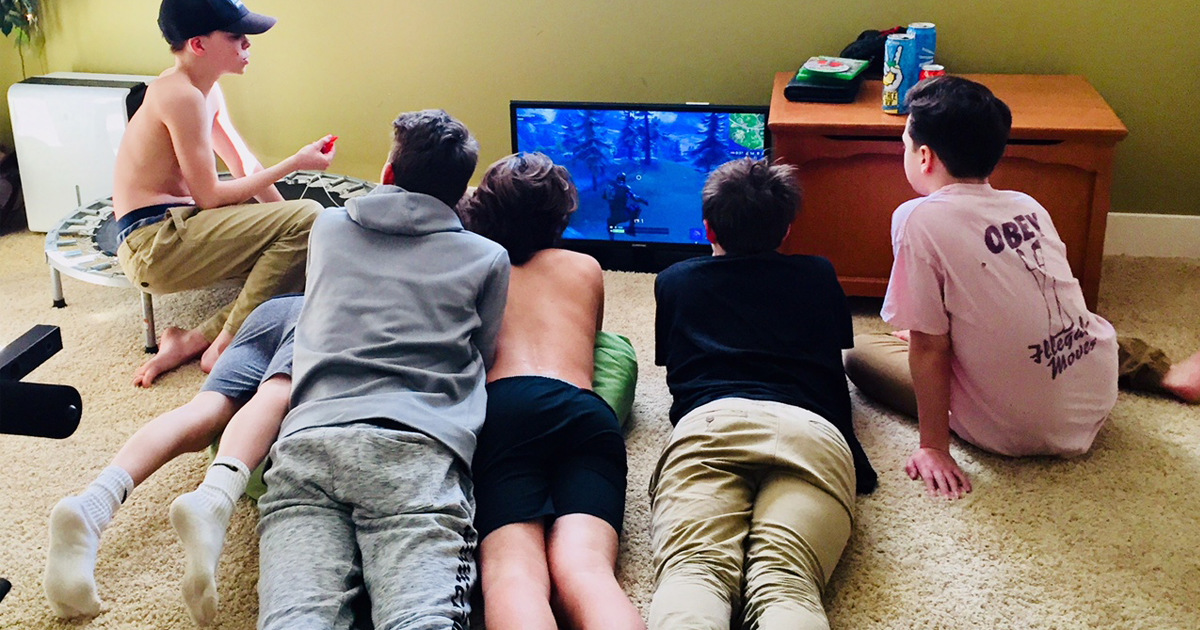No. I'm not talking about that F-word.
I'm referring to the latest craze in video gaming that in just a few months has created a full-on cult following—mainly of tween and teenage boys but also girls, moms and celebrities. Even my kids' teachers are playing it. It's called Fortnite Battle Royale and if you haven't heard of it yet, don't worry: You will.
So, what is it about this video game that makes is so special? To understand the fascination, let's take a closer look.
My first thought while watching my boys—ages 13, 13 and 10—playing it was: "OMGosh ... You're in the Hunger Games!" Fortnite has up to four players cooperating on various missions to ultimately be the winning team. The animation is so advanced and the game so fast and competitive, you can hardly take your eyes off it.
Coming from someone who doesn't give a rip about video games, trust me: It's cool. The bigger reason for the obsession for teens, however, is that it's social. Most play with headsets, so they can communicate with one another about strategies and tactics in their quest to win. They play with their friends from school, camp, teams ... You name it, and it's opened the door to new friendships. It's not an easy game, so when you win it's to be highly esteemed.
Does it sound like I'm endorsing the game? Hold up. Welcome to our dirty little secret: Fortnite has significantly changed the dynamics of our household.
Ever since my boys downloaded it to the Xbox last Christmas, this game has brought to our home both cheers of joy and tears of sadness; high fives and MMA-worthy wrestling matches; peace and quiet when we needed it most and full-blown family meltdowns. Every day there are arguments about whose turn is it, how much time so-and-so got playing it, and how early or late it is acceptable to play.
And it's gotten progressively worse.
They've lost interest in other activities they normally love. They have grown more irritable. They forget to take pee breaks. The other day my youngest came upstairs, and I noticed that the lazy left eye of his toddler years was back. Last night my son came home from soccer practice saying he was starving, until he learned his brothers weren't home. Suddenly dinner could wait—he had the Xbox to himself!
Why not just pull the plug, you ask?
I get it. I'm annoyed with myself even as I write this. But I promise you I care.
Parents are challenged daily with the technology, tools and content available at our kids' fingertips and it's overwhelming, complex and scary! Social media especially concerns me, which is why this game feels like a safer, more positive, more acceptable alternative.
So, what does a parent do?
I'm not an expert. I'm just a mom with smart friends who share good research. I'm not a psychologist, but I do know gaming—especially with those that are more violent—can result in mental health issues and even worse. I'm nowhere near perfect, which is why the suggestions offered below are still in the process of being implemented and tested.
Here's our plan:
- Play with your kids.
Want to really get in their heads? Why not learn to play the game—or at least watch them on occasion? When they race upstairs to share with you that they won a game, celebrate it. Ask them who was on their team? How did they succeed? You'll learn more about their friends and they'll feel that maybe you actually "get them" after all. - Talk with your kids.
They've already heard you complain. No need to remind them—again—that their brains are turning to mush and that, in your day, you played outside from sunup to sundown. Come at it with understanding and without threats.
Tell them you get that it's fun, social and cool.
Also, tell them that you're concerned about their health—and why. That just this year, the World Health Organization recognized gaming disorder as a mental health issue. That the American Academy of Pediatrics advises parents to place consistent limits on screen time, ensuring adequate sleep, physical activity and other behaviors essential to health. That experts fear games that include shooting and violence can trigger emotional desensitizing.
Then tell them you are going to set some limits, but want their input. - Tackle technology with technology.
I've been talking for years about buying a device that would help monitor our family's screen time. Fortnite finally got me to buy the Circle, which, for $99 (message me and I'll give you a coupon code for $15 off), allows you to set time limits for all of the devices in your home, filter content by age and more. - Make a plan and stick to it.
Setting limits doesn't do any good unless you follow through. For us, school, sleep and physical activity will always trump screen time. Keep things simple: Make the rules clear and concise. When they are cut off, be prepared for withdrawal symptoms. Have some suggestions ready for other things to do—lift weights, help prepare a meal, do some artwork or read to earn more screen time.
I know that I'm not alone in feeling that our family is under a real-life attack by the Fortnite craze. And while I may never feel that I've 100 percent won the parenting game, you can be sure as that F-word that I won't go down without trying.
 Written by Jill Carroll, a marketing manager at Serendipity Media, publisher of West Michigan Woman magazine. Jill resides in Cannonsburg with her husband, George, and their three boys.
Written by Jill Carroll, a marketing manager at Serendipity Media, publisher of West Michigan Woman magazine. Jill resides in Cannonsburg with her husband, George, and their three boys.




